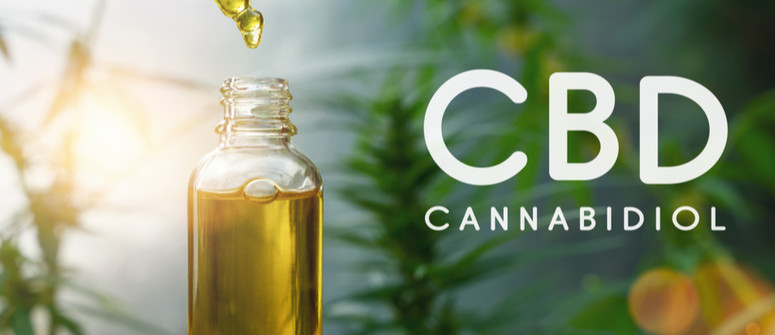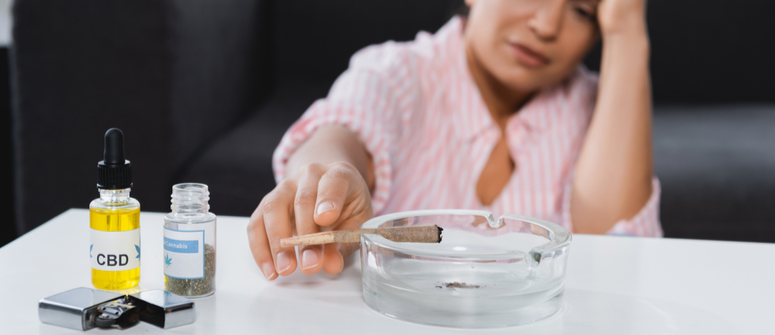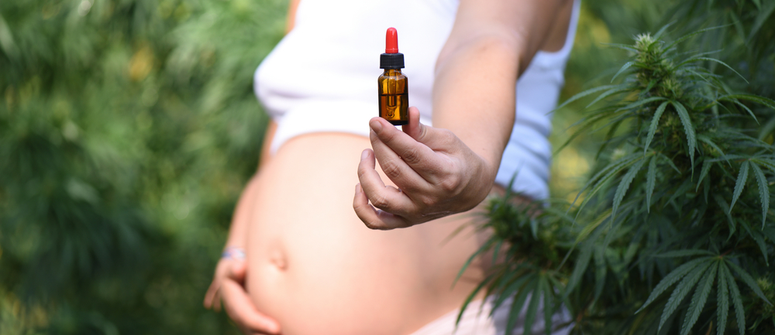What are the side effects and risks of CBD?

Like many substances intended to benefit well-being, CBD also has its drawbacks. So, what are the side effects and risks of CBD? What does the science say about using CBD during pregnancy, or alongside medications? Read on to find out.
Contents:
Since medical cannabis came to prominence in the early 2010s, cannabidiol use has been on the rise. CBD, as it’s more popularly known, has developed a reputation as a wonder substance that can potentially provide relief for numerous physical and mental conditions.
As more research is released, experts have been able to pinpoint the pros and cons of CBD use. And a quick Google search will lead you to a long list of articles on the plausible health benefits of CBD.
But, in this article, we’ll focus on the possible side effects and risks that come with taking CBD oil and other CBD products. We’ll look at how the cannabinoid affects specific functions, and provide tips on how to use CBD safely.
What Is CBD?
CBD is one of the many cannabinoids found in both hemp and cannabis plants. But, unlike its close cousin THC, cannabidiol does not produce any mind-altering effects.
Also unlike THC, CBD does not bind with the CB1 and CB2 receptors of the body’s endocannabinoid system. Instead, it activates other receptors, like 5-HT1A serotonin receptors. As a result, CBD has the potential to induce relaxation and reduce feelings of nervousness.
CBD products come in various forms, from gel caps and edibles to topical creams and, of course, CBD oil. The latter is the most commonly used variant, which is usually applied sublingually (under the tongue).
Does CBD Have Side Effects?
Short answer: yes, it does. Tests conducted on animals have yielded adverse side effects, and in the case of humans, the potential problems lie primarily in CBD’s interactions with other drugs.
It’s important to note that more research needs to be done to determine the full range of cannabidiol’s side effects.
Potential Side Effects of CBD
Let’s delve in a little deeper. Based on various scientific findings, here are some of the potential side effects of CBD.
Changes to Appetite and Weight
Appetite change is one of the most common potential side effects of CBD use. In many cases, users experience an increase in appetite, potentially resulting in weight gain.
In a 2015 study, researchers surveyed 117 parents of children with epilepsy. The patients were given 4.3mg/kg/day of CBD over a period of 6.8 months. At the end, 30% of respondents reported an increase in appetite, which is generally perceived as a positive effect.
This 2017 review, however, references a study that showed the exact opposite result. It describes a three-month clinical study on 137 children and young adults with various forms of epilepsy. All of them were given Epidiolex, a now-FDA-approved synthetic CBD solution. In total, 16% of respondents reported experiencing reduced appetite.
Dizziness
It’s worth noting that CBD affects people differently, with some individuals experiencing lightheadedness and dizziness upon taking the cannabinoid. It could be that changes to blood flow and blood pressure are responsible, but this is not scientifically proven. Still, research shows that dizziness is a common side effect of certain medications, like antibiotics and antihypertensives, to name a few.
Diarrhoea
Diarrhoea is another common side effect experienced by CBD users. Let’s go back to the aforementioned 2017 review on children with epilepsy. Another highlighted study was one performed on 261 predominantly child patients.
Upon being given Epidiolex, researchers noted a median reduction in seizure frequency of 45%; however, 10% of patients reported adverse effects, diarrhoea included.
CBD-related diarrhoea could be caused by the use of poor-quality products. Another reason could be the presence of MCT oil, an ingredient used in certain CBD oil formulations. As a 2007 study reveals, MCT may be a cause of loose stool, especially in children.
Fatigue
Episodes of fatigue, tiredness, and drowsiness are some of the potential drawbacks of taking CBD.
This is described in a year-long study published in 2015, in which 162 patients suffering from various forms of epilepsy were administered CBD.
Within the sample, 25% experienced drowsiness while 13% had episodes of fatigue.
Dry Mouth
For recreational cannabis users, dry mouth is one of the common side effects of THC. But, as claimed in some studies, it’s also seen in CBD users.
This 2009 article featured a study on five patients dealing with dystonic movement disorders. They were administered oral CBD in rising doses, from 100 to 600/mg per day, with the experiment lasting for six weeks.
While all patients reported a 20 to 50% improvement in dystonia, they also experienced various side effects, including dry mouth. Others experienced lightheadedness and sedation.
Lower Blood Pressure
We did mention dizziness as a potential side effect of CBD use. However, it isn’t always perceived to be a bad thing, as it is sometimes a sign of lowered blood pressure.
This 2017 randomised study administered 600mg of CBD or a placebo to nine healthy male volunteers. It ultimately concluded that cannabidiol potentially caused a decrease in both resting blood pressure and the blood pressure increase resulting from stress, which is usually linked to an increase in heart rate.
A 1993 study shows similar findings, this time drawing a link between CBD and lowered cortisol levels.
Eleven participants received 300mg and 600mg of placebo and cannabidiol, respectively.
Results describe CBD as having the potential to significantly lessen cortisol in the body after just 120 minutes of administration. The researchers also reported a potential sedative effect from CBD in this regard.
Headaches
Headaches are part of the list of potential side effects of CBD use. But, the good news is, these incidents appear to affect a small percentage of users.
Take this 2019 clinical study, for instance. Only two out of 88 patients who were given 1000mg of CBD per day experienced headaches.
One possibility for headaches that experts point to is the Jarisch-Herxheimer reaction. Don’t let the fancy name throw you off; it’s simply the reaction that occurs after the release of endotoxins resulting from the death of microorganisms. In some cases, headaches are a common reaction.
The Jarisch-Herxheimer reaction happens when there’s an overload of antioxidants like vitamin C. CBD is also known for its potential as an antioxidant, which could lead to possible headaches from the Jarisch-Herxheimer reaction.
That said, some experts will advise lowering CBD dosage to let the body get used to the presence of cannabinoids. The recommended dosage in this case is around two 0.05ml drops twice a day.

What Are the Risks of Taking CBD?
Now, let’s get a little more serious here. In this section, we’ll talk about what to avoid in regard to using CBD. Doing so will help mitigate any risks.
If you’re diving in for the first time, these are just some of the things worth noting.
Poor-Quality CBD Products
Since the demand for CBD has become so high, those in the black market are taking advantage. The result: poor-quality CBD products that may lead to adverse effects down the line.
In 2019, fears about “toxic” CBD products out of China grew rampant in the UK. At the time, the country was just a year into the legalization of cannabidiol for medical use.
What became a cause for concern was the supposed presence of pesticides in these products. Not only do they bear no benefit, but they could also potentially harm one’s health.
These are the usual troubles that unregulated markets run into. But, once the process is streamlined, there’s a small chance of such polluted products making their way to consumers.
Overdosing on CBD
There is no record of anyone experiencing a lethal overdose on CBD. First off, CBD is widely considered to be a non-toxic, non-recreational substance. It is even deemed by some to have the potential to prevent drug relapses. That alone significantly reduces the chances of overdosing on cannabidiol.
However, taking more drops than the recommended dosage could lead to some of the side effects mentioned above. In that case, you may experience mild discomfort, although this should be short-lived.
Taking CBD While Pregnant or Breastfeeding

More research is needed to fully determine the pros and cons of taking CBD while pregnant or breastfeeding. But, based on most studies, using cannabis, in general, may be detrimental in more ways than one.
For one, the US Centers for Disease Control (CDC) found that marijuana use during pregnancy potentially causes low birth weight in newborn children, although this is most likely due to THC. Other potential risks include possible learning and attention issues for the child as they grow older.
As more studies come to light, experts will soon find more definite answers. But, for now, the consensus would be to try and avoid cannabis and CBD oil while pregnant.
How Long Does CBD Stay in Your System?
On average, it takes two to five days for cannabidiol to leave the body. However, the amount of time will depend on several factors.
Dosage and frequency are two good examples. The more you use, the more regularly—the longer it takes to leave your system.
Method of consumption also matters. Ingesting CBD in the form of gummies or capsules means the cannabinoid has to go through the digestive system and liver. It then enters the bloodstream, which makes it linger. Vaping CBD or taking CBD oil sublingually, on the other hand, are more fast-acting. The effects are felt within minutes, which means the CBD stays in the body for a shorter amount of time.
Finally, your weight and metabolism will affect CBD’s elimination period, just like with any other substance you take.
Does CBD Affect Medication?
Yes, CBD has the potential to influence the effects of medications. In some cases, cannabidiol may interfere with the metabolisation process of certain drugs. As a result, these medications aren’t able to work as effectively as they should.
In other instances, CBD’s interaction with drugs leads to slower degradation (aka breakdown) of CBD. That, in turn, leads to a higher dose of CBD, which ultimately isn’t always desired. This interaction can also be used to benefit patients, but only under close medical supervision.
What Drugs Should Not Be Taken With CBD?
Given how there are some potential side effects when taking CBD with other medications, here’s a list of drugs to cross off your list.
First off, here are the ones that are found to reduce CBD’s bioavailability:
• Phenobarbital (seizure medication)
• Phenytoin (anticonvulsant for pre and post-surgery)
• Rifampicin (antibacterial medication)
• Carbamazepine (for epilepsy and neuropathic pain)
These drugs can potentially hinder the metabolisation of other medications and cannabinoids when combined:
• Clarithromycin (antibacterial medication)
• Ketoconazol (antifungal medication)
• Ritonavir (medication for HIV/AIDS)
• Itraconazol (antifungal medication)
Drugs that may increase side effects when taken with CBD:
• Antidepressants (like Prozac)
• Amiodarone (heart medication)
• Benzodiazepines (sedative)
Other drugs that shouldn’t be co-administered with CBD:
• Warfarin (blood thinner)
• Levothyroxine (thyroid medication)
• Clobazam (seizure medication)
• Lamotrigine (seizure medication)
Drugs that may potentially increase liver toxicity when combined with CBD:
• Methotrexate (leukemia and cancer medication)
• Valproic acid (for seizures and mental conditions)
Is CBD Addictive?
We alluded to this in an earlier section, and the answer is no. Most experts would agree that CBD is a non-addictive substance.
To further drive the point home, here’s what the World Health Organization says about cannabidiol: “In humans, CBD exhibits no effects indicative of any abuse or dependence potential”.
The WHO also highlighted clinical trials on Epidiolex as an anti-seizure medication. It concluded that said drug “has been demonstrated as an effective treatment” for epilepsy.
What To Look For When Buying CBD
If you’ve reached this section of the article, you’re probably headed in the direction of purchasing some CBD oil or supplements for yourself. But, before you make that transaction, here are some things to keep in mind:
• THC content: When looking for CBD oil or capsules, you’ll want the THC level to be below the legal cutoff (0.2% in Europe and 0.3% in the United States). Anything above that means it wasn’t sourced from hemp, making it illegal.
• Hemp source: Many companies settle for hemp products that weren’t grown in the best conditions. A legit CBD oil manufacturer/retailer should be able to give you a full background of how its hemp was sourced.
• Oil colour: The hue of the CBD oil doesn’t mean everything, but if it comes in a dark green colour, you’ll probably want to steer clear. This contains chlorophyll, plant material, and other undesirables that won’t add much to your experience. Filtered, purified CBD is what you want. These come in a more golden colour.
• Extraction method: CBD is processed through either food-grade ethanol or CO₂ extraction. The latter is more expensive, but is by and large deemed to be safer and cleaner.
• If all else fails, always check the label. Another way to check the legitimacy of a CBD product is through its ingredients list. One can’t simply make claims of purity without transparency. If you come across a product like this, be wary.
Is CBD Really Safe To Use?
Considering the research conducted up to this point, especially clinical trials, it’s widely believed that CBD is generally safe for consumption.
However, it’s also key to weigh the advantages and disadvantages, including potential side effects and drug interactions. Cannabidiol may be regarded for its plausible health benefits, but its side effects are also worth familiarising yourself with.
To be on the safest side, do your due diligence. Better yet, seek the advice of a medical professional. They will be able to give you a detailed breakdown of the information you’ll need before giving CBD a go.




